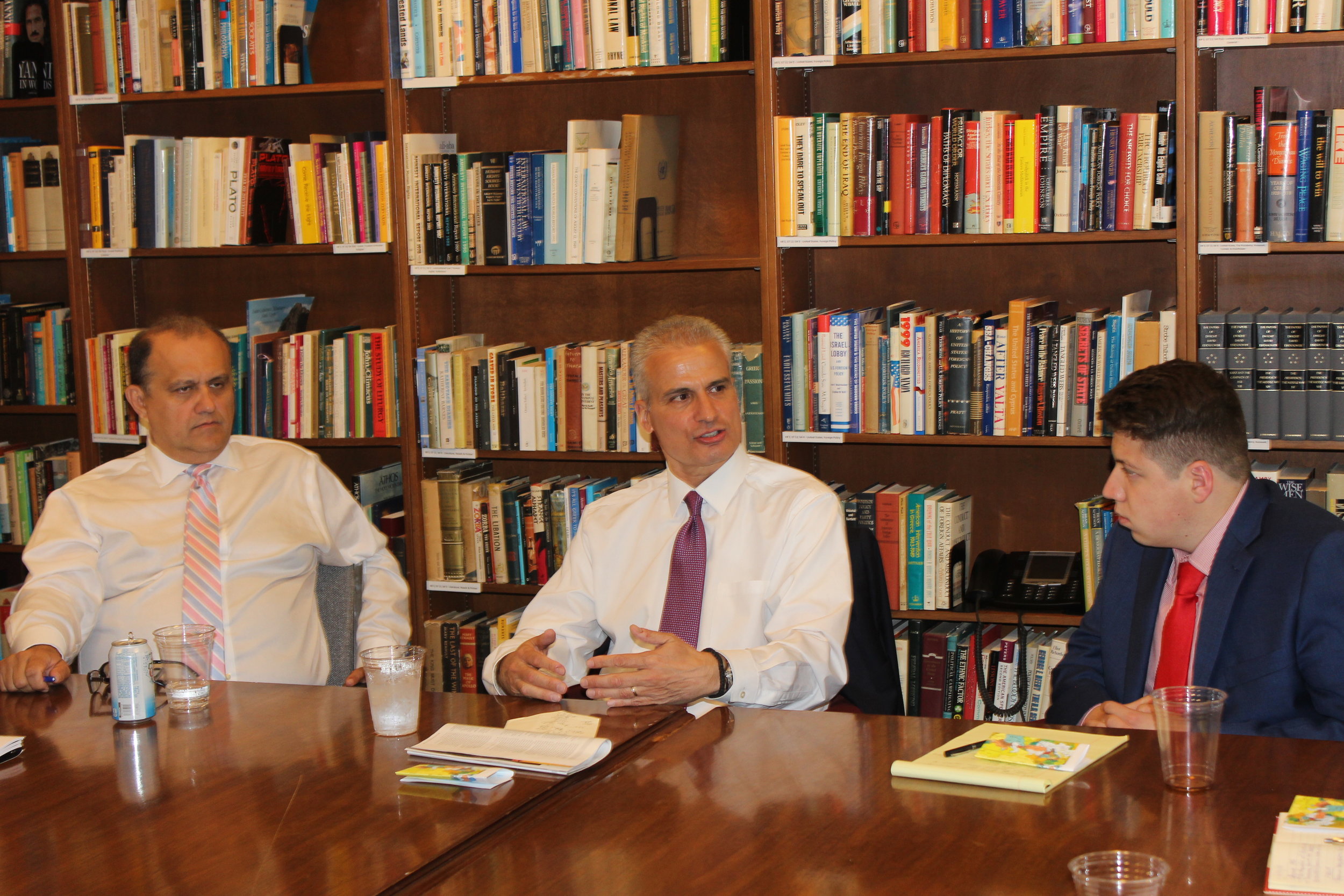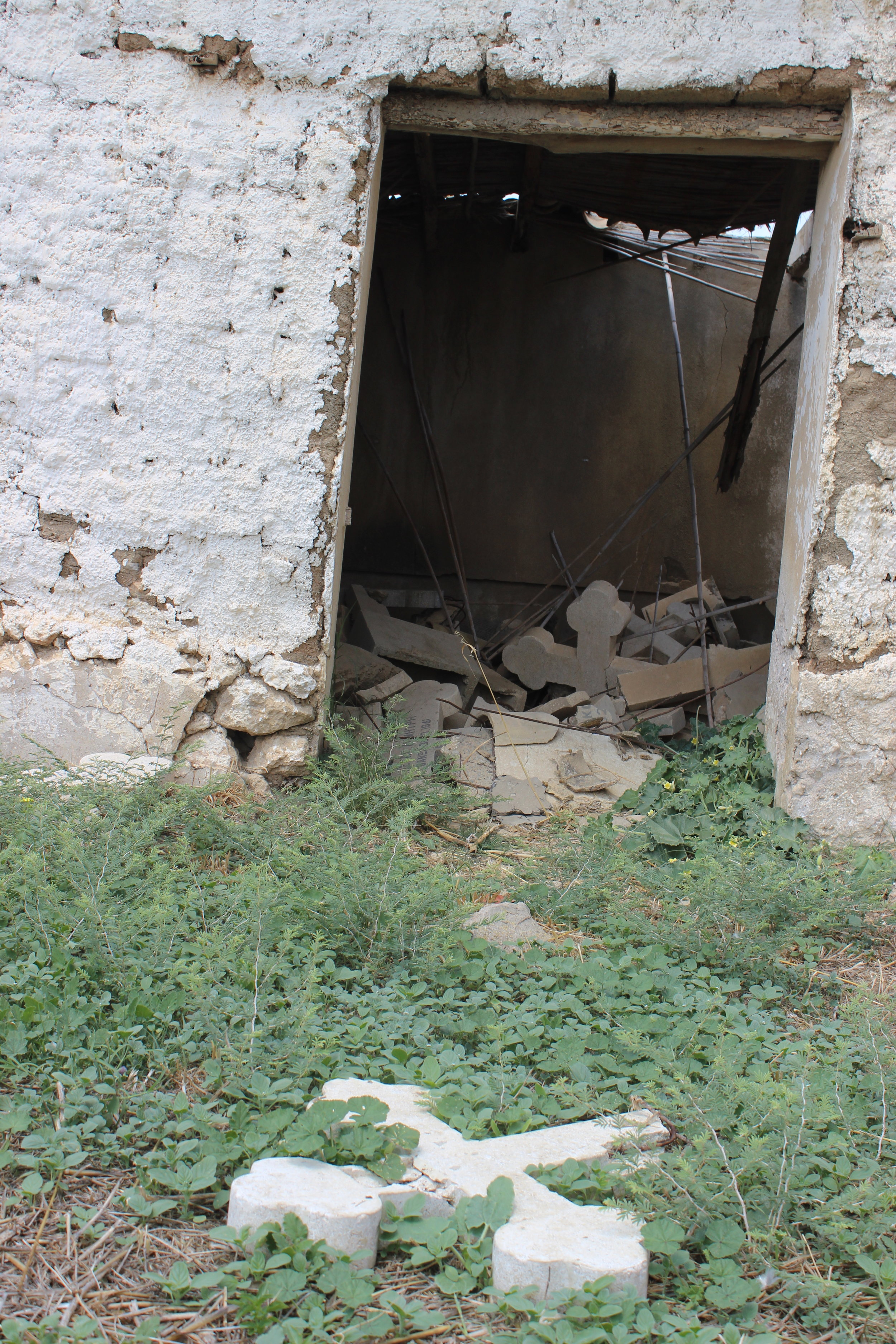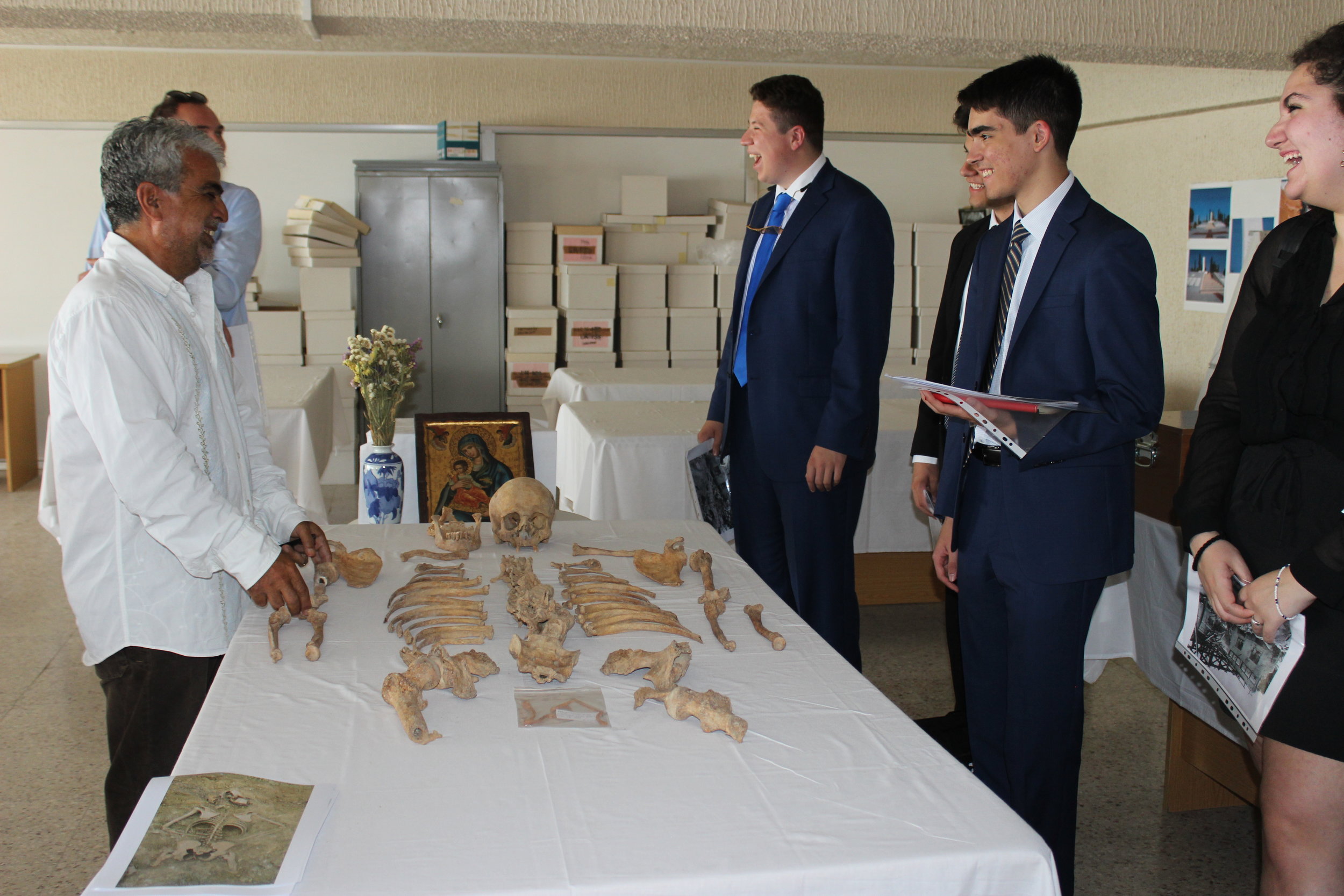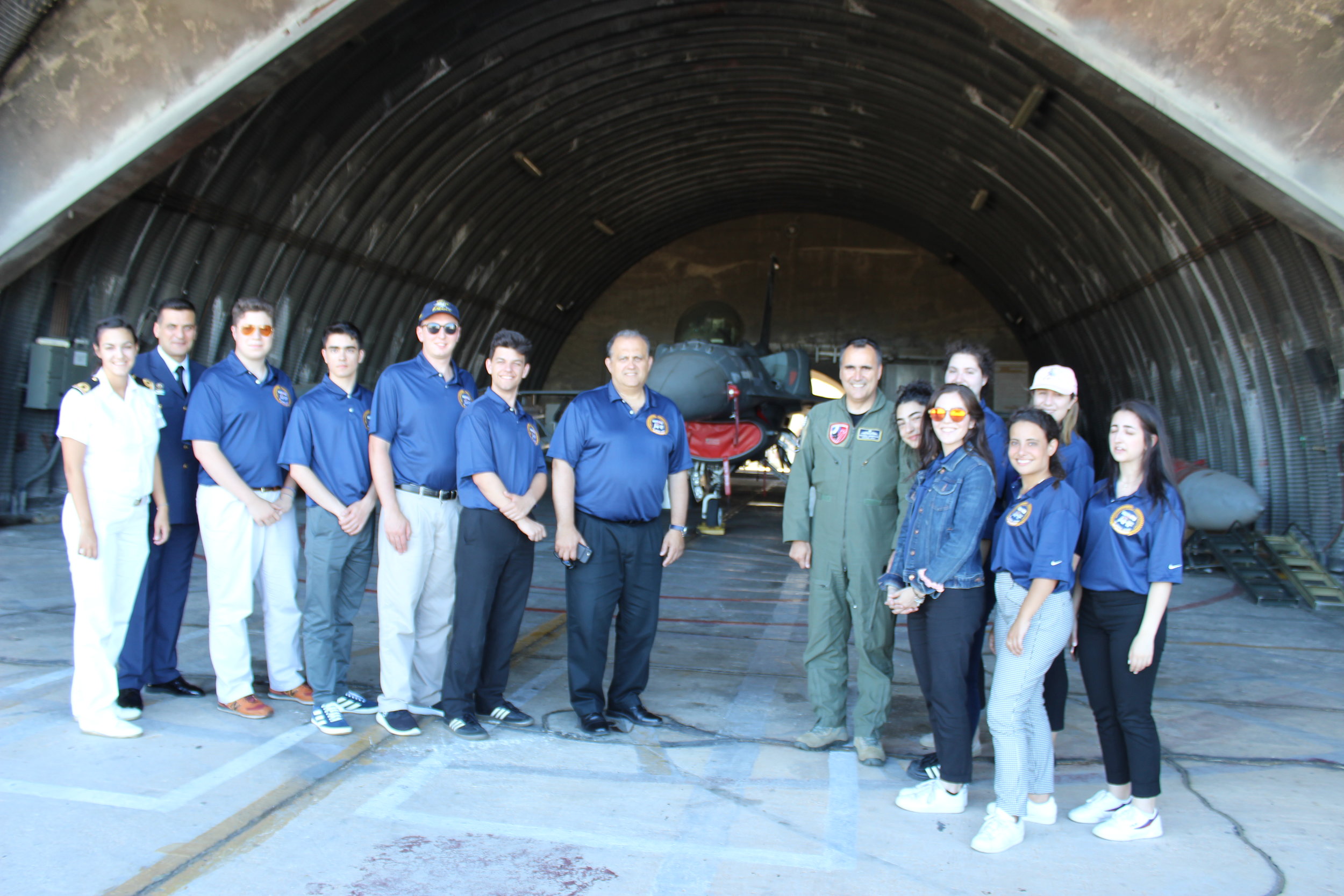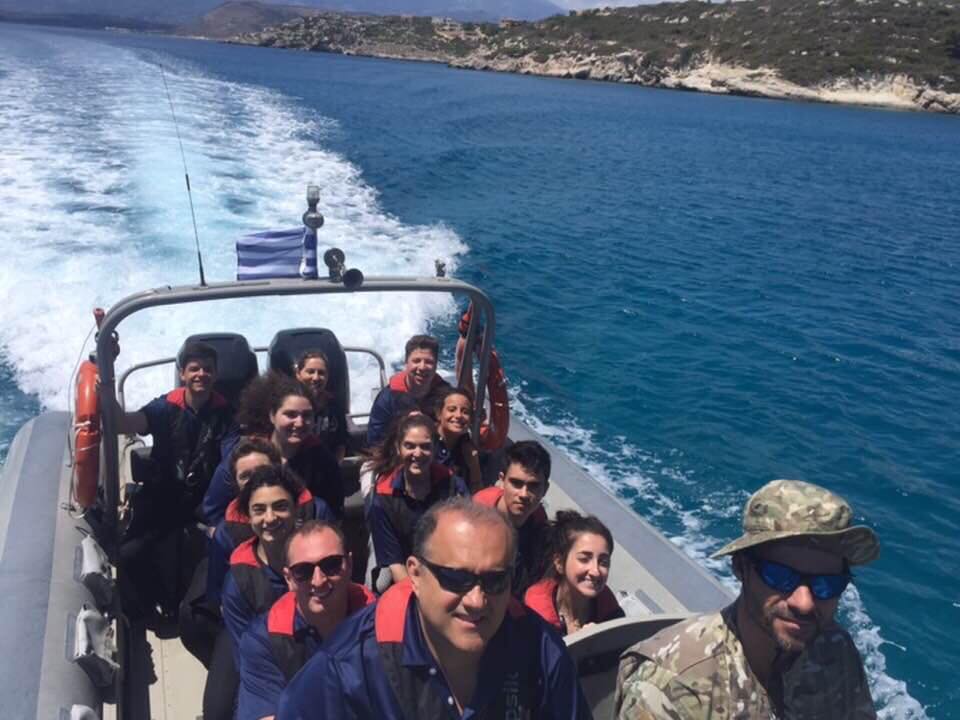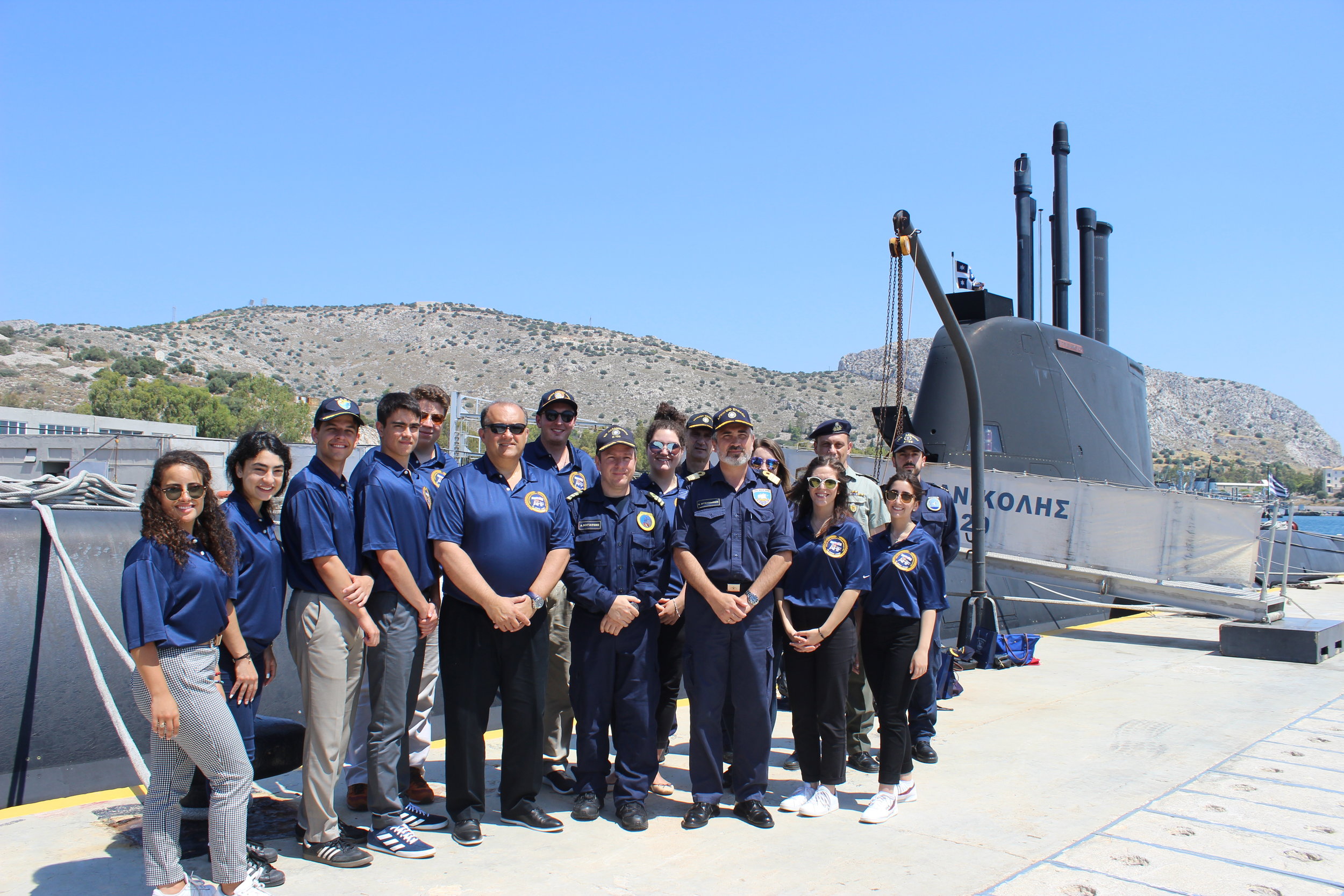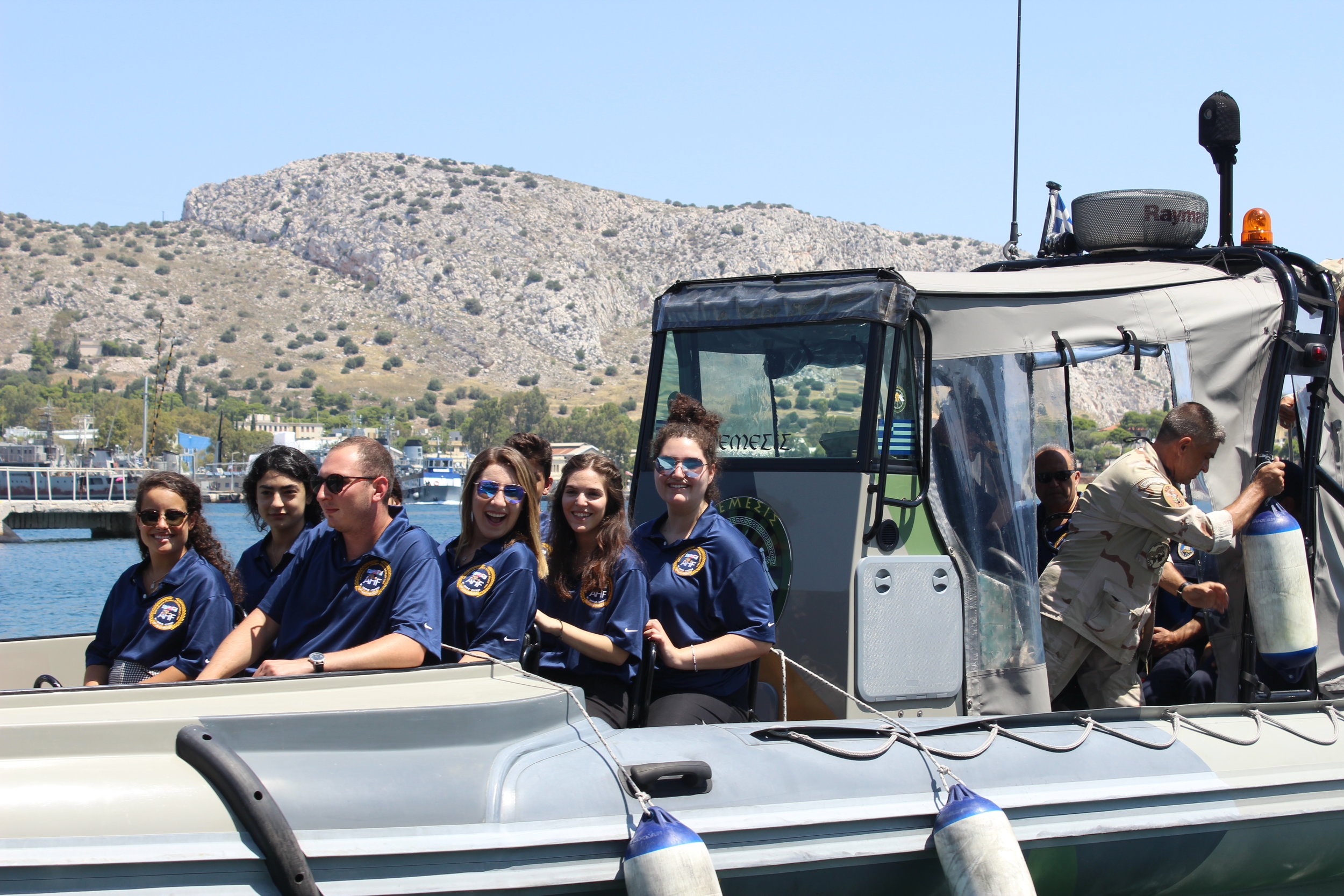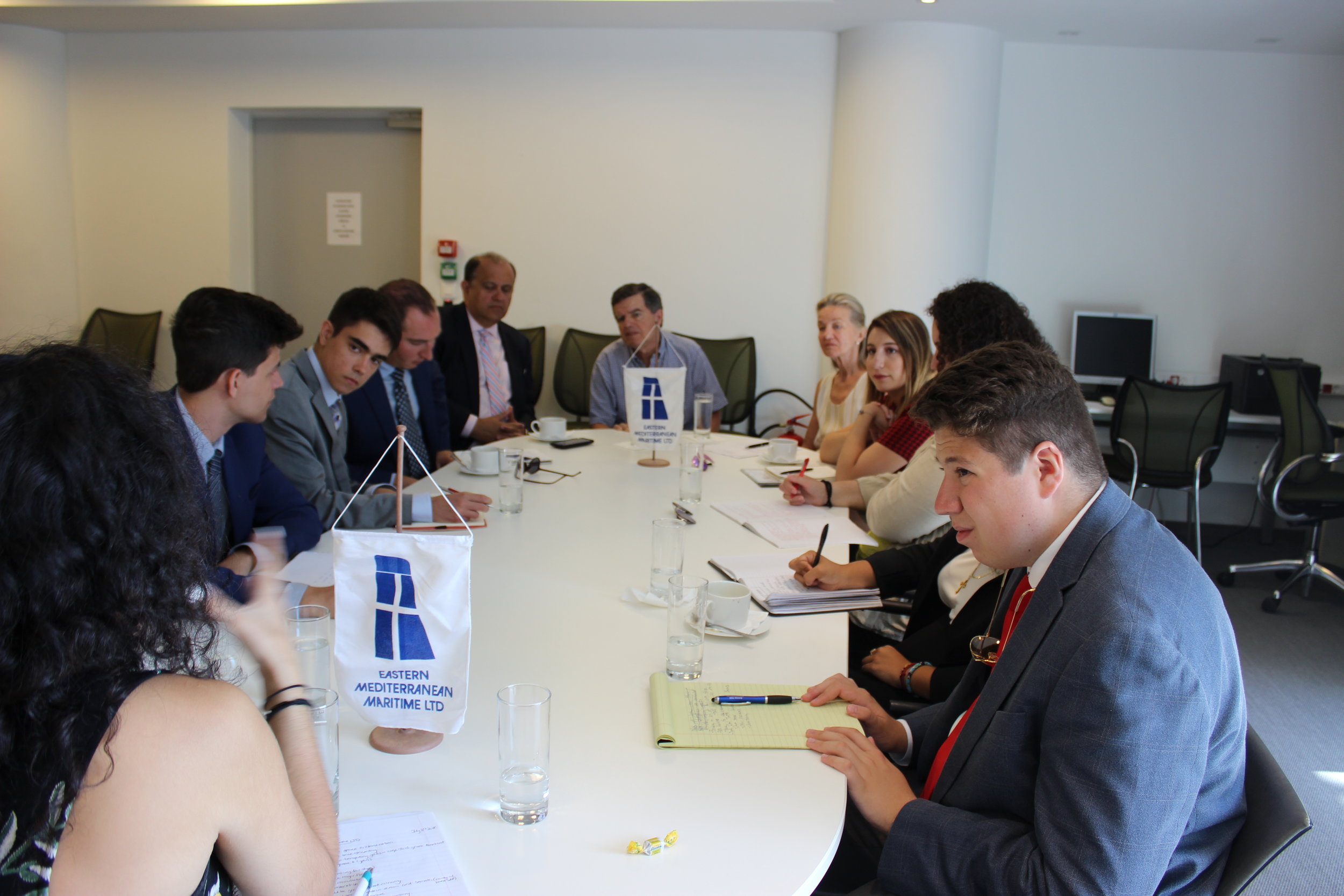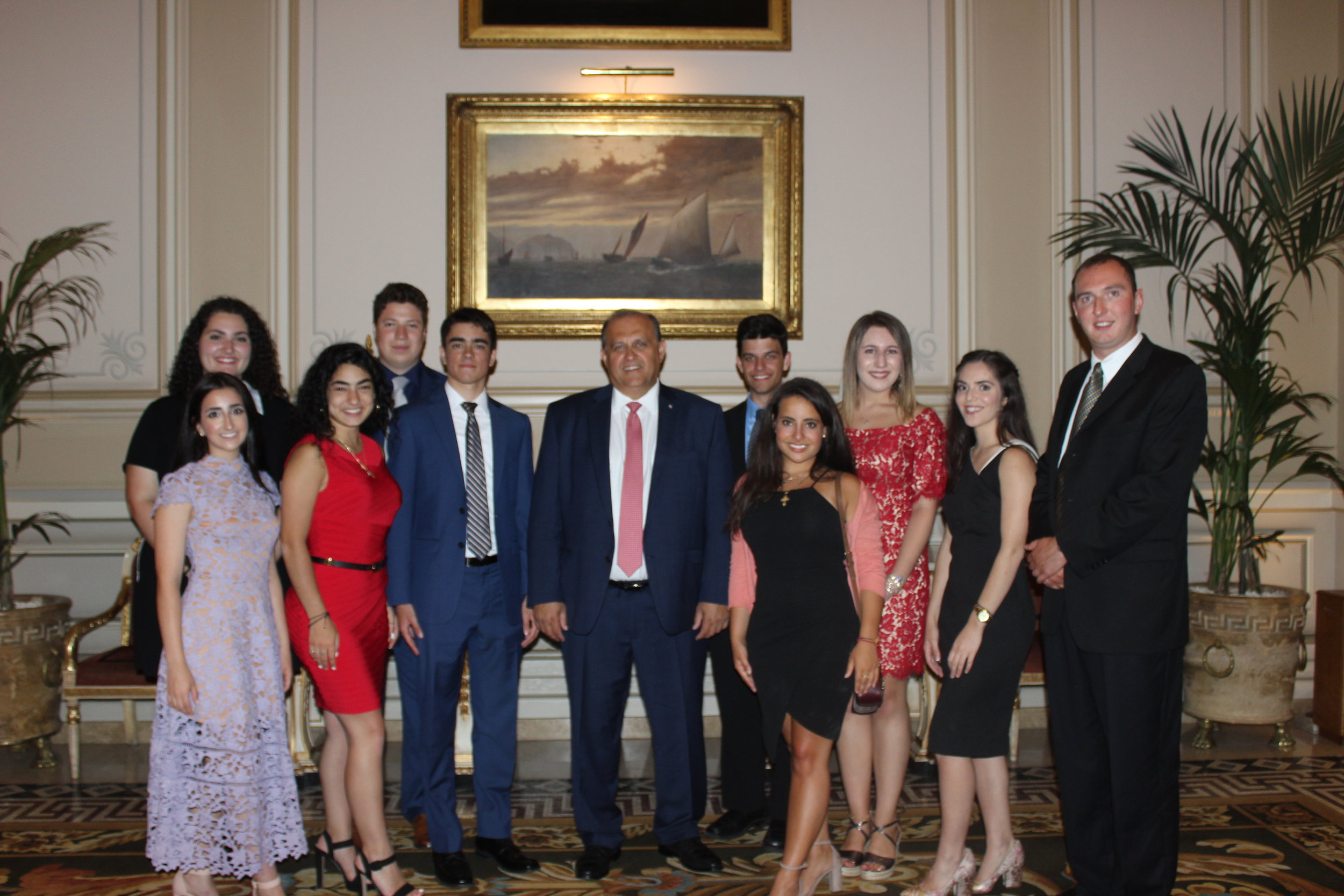STUDENTS GAIN FIRSTHAND EXPERIENCE ABOUT EASTERN MEDITERRANEAN REGION
No. 55
The American Hellenic Institute Foundation (AHIF) Foreign Policy Trip to Greece and Cyprus completed its landmark tenth year as ten students from across the United States participated in the 17-day program held June 29 to July 6, 2018.
The student participants were: Vanessa Balis, an Honors Scholar and Media Fellow junior at DePauw University majoring in English Literature and minoring in Spanish; Floriana Boardman, a sophomore at Fordham University majoring in Political Science with a double minor in Orthodox Christian Studies and Middle Eastern Studies; Adonis Caramintzos, a junior at Hunter College pursuing dual majors in Economics and Political Science; George Evangeloulis, a Presidential Scholar junior at the University of Southern California, majoring in Journalism and Marketing; Marina Kiotsekoglou, a former AHI intern who graduated from Pennsylvania State University and is now pursuing a master’s degree at the Elliott School of International Affairs at George Washington University; Sophia Kyrou, a sophomore at Trinity College majoring in Political Science and Human Rights with a minor in French; Maria Nifakos, a Dean’s List student and rising senior at Emerson College, majoring in Journalism and minoring in Sociology and Political Science; Alexis Tsapralis, a summer AHI intern and junior Dean’s List student at Barnard College of Columbia University studying Political Science with a concentration in International Relations; Alexander Velis, a sophomore at the University of Illinois at Urbana Champaign’s Gies College of Business studying International Business and Finance; and Michael Zoumadakis, a recent graduate of the University of Utah’s David Eccles School of Business where he majored in Business Administration and minored in Political Science.
Photographic slideshow created and produced by 2018 participant, Vanessa Balis.
Throughout the program, the students received firsthand experience regarding the foreign policy issues affecting Greece and Cyprus, their relations with the United States, and the interests of the U.S. in the Eastern Mediterranean. Briefings and meetings were held with American embassies, officials from various foreign ministries, members of parliament, the armed forces, prominent think-tanks, and members of academia and the private sector of both countries. The principal events of the trip included a visit to the Turkish-occupied area in Cyprus and a day-trip to Naval Support Activity (NSA) Souda Bay, Crete, where the students toured the NATO Missile Firing Installation (NAMFI) and received numerous briefings.
“For the tenth consecutive year, the trip has provided a wonderful opportunity to lead an exceptional group of students to Cyprus and Greece,” AHI President Nick Larigakis said. “It was rewarding to see them gain firsthand experience about the foreign policy issues that concern U.S. relations with Greece and Cyprus. The AHI Foundation looks forward to offering this program annually as support for it has grown and student interest remains at significant levels since the program’s inception.”
WASHINGTON, DC: DIPLOMATS, LEGISLATORS BRIEF STUDENTS
Prior to their departure for Cyprus, the students gathered for briefings in Washington, D.C. from June 19 to June 21.
On June 19, the students assembled at AHI’s Hellenic House in Washington for a welcome reception, celebrating the tenth anniversary of the program. Twenty alumni of the program as well as AHI board members, Nicholas Karambelas and Dr. Athina Balta, were in attendance. Also in attendance were some of the many individuals who helped to make the student trip possible, including: Alexios Mitsopoulos, deputy chief of Mission, Greek Embassy to the U.S.; Konstantinos Polykarpou, consul, Cypriot Embassy to the U.S.; Emanuel L. Rouvelas, partner, K&L Gates; Brian Kelleher, general manager, Capital Hilton; and Konstantinos Georgiadis, general manager, Amphitrion Holidays.
The following day, the students received their first briefing from Nicholas Karambelas, Esq., AHI volunteer legal counsel and partner, Sfikas & Karambelas LLP; and met the Ambassador of Greece to the U.S., Haris Lalacos, for a briefing at the Embassy of Greece. The students also participated at a briefing with the Cypriot Charge d’affairs to the U.S., Andreas Nikolaides, at the Embassy of Cyprus. In the afternoon, the group received a briefing from John Sitilides, Eastern Mediterranean geostrategic expert.
On June 21, the students engaged in briefings with experts and diplomats. In the morning, the students met with Diviya Sharma, Cyprus desk officer, and Angela Gemza, Public Diplomacy desk officer, for a briefing at the U.S. Department of State. In the afternoon, the group received briefings from Ambassador Patrick Theros, former U.S. Ambassador to Qatar, and Paul Glastris, editor of Washington Monthly. Following a day full of briefings, the students received a private tour of the U.S. Capitol and learned about the latest developments on Capitol Hill pertaining to Hellenic-American issues. At the conclusion of the tour, the students were briefed by staff of co-chairs of the Congressional Caucus on Hellenic Issues, Shayne Woods, legislative assistant, office of Congressman Gus Bilirakis (R-FL), and Christina Parisi, legislative director, office of Congresswoman Carolyn Maloney (D-NY). In the evening the students also received a private tour of the West Wing of the White House.
CYPRUS
The group arrived in Cyprus’ capital, Nicosia, on June 24. During their five-day stay, the students met with several high-level government officials, including: Cypriot Foreign Minister Nikos Christodoulides; Government Spokesman Prodromos Prodromou; Greek Cypriot Chief Negotiator for the Cyprus Problem Andreas Mavroyiannis; Commissioner to the Presidency for Humanitarian Affairs and Overseas Cypriots Fotis Fotiou; and President of the House of Representatives Demetris Syllouris. In addition, the students had an audience with United States Ambassador to the Republic of Cyprus, Kathleen Doherty, and members of her staff, at the American Embassy on June 26.
VISIT TO TURKISH-OCCUPIED CYPRUS
On their first full day in Cyprus, the students visited the occupied area: one of the most eye-opening parts of their trip to the divided country. The students described their crossing over into the occupied area as entering a different world. They observed a strong, undeniable Turkish presence in the occupied area as monuments to Turkish nationalism were omnipresent throughout the area’s landscape; the most somber of which are the two flags painted on the side of the Pentadaktylos Mountains, one Turkish and the other representing the so-called “Turkish Republic of Northern Cyprus.” These tributes serve as constant reminders of the injustice of the occupation and filled the students with a range of sobering emotions.
While in the occupied area, the students visited a long-destroyed Orthodox Church, juxtaposed against a newly-built mosque only yards away. Surrounding the hollow church were dozens of desecrated graves and looted Orthodox Christian cemeteries. Furthermore, the itinerary included a visit to the fenced-off city of Varosha: a once bustling port city that is now merely a haunting testament to the realities of the Turkish occupation. The group was shocked to witness vacationers enjoying the ocean while armed Turkish soldiers guarded decimated buildings right on the beach’s edge. In the afternoon, the students enjoyed the rest of their day at Agia Napa beach before traveling to the popular city of Larnaca for dinner.
The students began the following day, June 25, with a meeting with the Greek Cypriot Negotiator for the Cyprus Problem, Ambassador Andreas Mavroyiannis. The ambassador discussed the faults of the Annan Plan and Turkey’s insistence on the Treaty of Guarantee, as well as the desire of the Cypriot government to resume negotiations in the future. The students then met with the President of the Cypriot House of Representatives, Demetris Syllouris, to further discuss how the U.S. can support Cyprus as they work towards a solution to the now 44-year-old problem. In the afternoon, the group was personally briefed by Lt. General Ilias Leontaris, Chief of the Cypriot National Guard at their General Staff Headquarters. The students then travelled to and toured the “Lt. General Evangelos Florakis” Naval Base and the “Andreas Papandreou” Air Base. That evening, Lt. General Leontaris hosted the students for a reception at the Officer's Club in Nicosia.
Tuesday, June 26 began with a briefing on Cyprus’ history by Mrs. Titina Loizidou before meeting with Presidential Commissioner Fotis Fotiou, and Xenophon Kallis, director of Service for Missing Persons. The students then visited the Anthropological Laboratory of the Republic of Cyprus where Director Kallis briefed the students on the process of locating and identifying the remains of missing persons which occurred because of the brutal Turkish invasion of 1974. The issue of the missing persons is still an open wound that personally persists to this day among Cypriot families, a remnant of the Turkish invasion over forty years ago. Following a lunch sponsored by Commissioner Fotiou, and hosted by Thalia P. Antoniou and Andri Trichina, U.S. Ambassador to Cyprus, Kathleen Doherty, brief the student group at the U.S. Embassy in Nicosia. The students’ day ended with a meeting with government spokesman, Prodromos Prodromou.
On their final day in Cyprus, June 27, the students toured Archbishop Makarios III’s chambers and the Byzantine Museum. They also toured the old Nicosia airport, which has been frozen in time since the 1974 invasion. UNFICY Officer Peter Vanek served as the tour guide. Further, the students visited the Tomb of Makedonitissa. The Cyprus itinerary concluded with a visit to Ministry of Foreign Affairs where Ambassador Giorgos Zodiatis, director of Energy and Marine Policy Directorate, and Dr. Stelios Nikolaides, director of Hydrocarbon Service, briefed the students on developments within Cyprus’ Exclusive Economic Zone. Finally, the students met with Foreign Minister Nikos Christodoulides and the Director of Middle East and North Africa Directorate and former Cypriot Ambassador to the United States, Ambassador Andreas Kakouris.
Overall, the Cyprus journey provided the students with a lasting impression about the Cyprus issue. Their visit to the island was both educational and inspirational.It informed the students about the different facets of Cypriot foreign policy and showed them the devastating effects of the illegal military occupation by Turkey since 1974.
GREECE
After an enlightening trip to Cyprus, the students embarked for a nine-day visit to Greece.
On their first day in Athens, June 28, the students hit the ground running with a briefing provided by Elisabeth Fotiadou, director, A7 Department for North America, Ministry of Foreign Affairs. They also received a guided tour of the Acropolis Museum and were hosted for dinner at the Acropolis Museum restaurant by Michalis Kokkinos, head of the General Secretariat for Greeks Abroad, Ministry of Foreign Affairs.
STUDENTS RECEIVE TOUR OF NSA SOUDA BAY & SALAMIS NAVAL FLEET HQ
The students departed on a day-trip to visit Naval Support Activity (NSA) Souda Bay, Crete, June 29. Commodore Georgios Agrafotis, H.N., director of Command Directorate of Souda Naval Base, welcomed the group of its arrival. Briefings with NATO Maritime Interdiction Operations Training Center (NMIOTC) Commander Commodore Stelios Kostalas followed. Commodore Kostalas personally escorted the group on a guided tour of the facilities via a skiff boat. The tour was followed by briefings from NATO Missile Firing Installation (NAMFI) Commander Brigadier General Kleanthis Karatsin. The students enjoyed a lunch hosted by the Unit Commanders at NAMFI’s Officers Club before their final stop of the day: a visit to the 115 Combat Wing and briefing from Colonel Ioannis Birbilis.
“A special thanks to Major Nikolaos Gogousis for his support and assistance that helped to make our visit to Souda Bay a productive and educational one,” Larigakis said. “The Public Relations Directorate at the Ministry of Defense really went above and beyond the call to ensure the students had a memorable visit.”
The students continued to learn about Greece’s defense and military capabilities with a briefing they received from Lt. Col. Christos Anastasiadis, deputy director, Public Relations Directorate, Hellenic National Defense General Staff, at the Ministry of Defense on July 4. The group also received a defense policy briefing and presentation along with a visit to the ministry’s Operations Center, led by Lt. General Konstantinos Floros, deputy chief of the Hellenic Armed Forces General Staff.
On their final day of the trip, July 5, the students arrived at Salamis for a Greek Naval Fleet Headquarters presentation, including a visit to a Greek naval frigate and submarine. They met with Commander in Chief of the Hellenic Fleet Vice Admiral Ioannis Pavlopoulos, H.N., for a tour of the submarine simulator and a ride on an H.S. Vosper, a fast patrol boat. Vice Admiral Pavlopulos graciously hosted the students for refreshments at his residence.
STUDENTS MEET WITH PRESIDENT OF GREECE AND MINISTRY, GOVERNMENT OFFICIALS
The group’s first full day of meetings in Athens, July 2, was nothing short of exciting. First, the students met with Minister of Tourism Elena Kountoura to learn about the importance of tourism for Greece’s economy and the Ministry of Tourism’s recent campaign featuring the “Greek Freak,” Giannis Antetokounmpo.
The students then had the honor of meeting with President Prokopis Pavlopoulos at the Presidential Palace. During the hour-long meeting, President Pavlopoulos presented each student with a gift and wished them success in their studies. The students were incredibly appreciative of the generous amount of time the president afforded to them. Furthermore, the students met with the Head of the Diplomatic Office of Prime Minister Alexis Tsipras, Vangelis Kalpadakis.
Their thrilling day ended with a guided tour of the War Museum, followed by a reception hosted by Tim Ananiadis, general manager, Grande Bretagne Hotel, and a dinner hosted by AHI-Athens President, George Economou at the Athens Club. On July 3, the students also enjoyed a group tour of Karaiskakis Stadium, home of Olympiacos F.C., which was sponsored by Olympiacos President Evangelos Marinakis. Mr. Marinakis also sponsored dinner that evening at the exclusive Vammos restaurant. Domenicos Masoulas, director, Olympiacos Corporate Social Responsibility, represented Mr. Marinakis.
STUDENTS MEET U.S. AMBASSADOR, CONCLUSION OF TRIP
On Tuesday, July 3, the students had the opportunity to learn about the significance of Greece’s shipping industry during a meeting with Athanasios Martinos, managing director of Eastern Mediterranean Maritime Limited. Also present at the meeting was Mrs. Marina Martinou from management at Eastern Mediterranean Maritime Limited.
The students then gained insight about Greece’s foreign policy with a briefing with Deputy Foreign Minister Terence Quick and Head of General Secretariat for Greeks Abroad Michael Kokkinos. They also attended informative meetings with Nikolaos Garilidis, A4 Directorate, Turkey; Sophia Grammata, A3 Directorate, Balkans; and Georgios Dimitriadis, A2 Directorate, Cyprus. Further, the students met with Dr. Thanos Dokos, general director of the Hellenic Foundation for European and Foreign Policy (ELIAMEP) before meeting with Tom Ellis, editor-in-chief, at Kathimerini English Edition, regarding the current political climate in Greece. The group ended their packed day with a Fourth of July reception held at the residence of United States Ambassador to Greece Geoffrey Pyatt.
The students had the opportunity to meet Ambassador Pyatt in a more intimate setting during their final briefing of the trip, which was also hosted at the Ambassador’s residence. During their briefing, the students expressed to the ambassador the wealth of information they acquired while on the trip and how they plan to implement that knowledge once they return home to the United States.
The trip concluded with a farewell dinner hosted by the American Hellenic Institute Foundation at the Grande Bretagne. Many of the officials with whom the students met, as well as AHI supporters, attended the dinner. Each student gave a brief speech reflecting on his or her experience. The students’ statements differed, but there was a common threat of gratitude toward all the AHI Foundation supporters. All students described their experiences on the foreign policy trip as immensely educational and life-changing.
“We are extremely grateful to all of our sponsors, both in Cyprus and in Greece, for their generous hospitality and for helping to make the students’ trip a memorable one,” Larigakis said. “Their selfless contributions to the AHI Foundation program are invaluable.”
In their own words….
Before my participation in the AHIF Foreign Policy trip, I considered participating in the Foreign Service. However, I was unsure of whether I had the capacity to do so. Now, I can say that this trip has opened up my eyes to a whole new part of politics that goes far beyond making policies or signing treaties. While interacting with the political officials on this trip, I began to realize how rewarding it is to interact with people whose cultures are different from my own. Working in the Foreign Service would force me to expand my thought process to think in ways I never have before, while meeting people from all around the world in a setting where we have a common cause and must find solutions together. As a Greek American, I already have experience balancing two strong cultures, a skill that I believe is essential to working in diplomacy. I am extremely thankful for my Hellenic culture for introducing me to the beauty of celebrating culture as well as AHIF for allowing me to participate in such a transformative program. - Vanessa Balis, an Honors Scholar and Media Fellow junior at DePauw University majoring in English Literature and minoring in Spanish.
This trip has truly opened my eyes to the hardships that Greece and Cyprus face and how critical it is for Greek-Americans to lobby Congress to support stronger U.S. relations with Greece and Cyprus. Through the American Hellenic Institute Foundation, I now understand how a relationship between the United States, Cyprus and Greece is beneficial to all three countries. Greece is not only a beautiful place to vacation, but it is the gateway to Europe and the crossroad to the Middle East. Greece gave the world western civilization and continues to give, but with a silent voice. It is time for my generation of Greek-Americans to raise the voice of Greece and Cyprus and alert the world to her hardships. After this trip, I am not only proud of my Greek culture like I have been for so long, but I am also proud of Greece and Cyprus. They are truly key countries in the Eastern Mediterranean with a crucial geostrategic position, as they not only offer stability to such a volatile area but are key allies to the United States. - Floriana Boardman, a sophomore at Fordham University majoring in Political Science with a double minor in Orthodox Christian Studies and Middle Eastern Studies.
The AHIF Foreign Policy trip for me was really an eye-opening experience, as I was able to meet leading policy makers in Greece, Cyprus, and the United States, who I would have never had the chance of meeting on my own. I was finally able to see for the first time the damage done in Cyprus and comprehend what Cyprus means to the future of U.S interests in the Mediterranean. Moreover, visiting the military facilities in Salamis and Souda Bay gave real value to what Greece is capable of and how valuable Greece is as both a partner of NATO and a U.S ally.
This trip allowed me to develop meaningful perspectives on what foreign policy really is, what foreign policy means, and how foreign policy is conducted, through meaningful meetings and discussions. This trip has most definitely challenged what I know and has allowed me to rethink what I can do and what the future holds for me. - Adonis Caramintzos, a junior at Hunter College pursuing dual majors in Economics and Political Science.
The AHI foreign policy trip is a program which has to be experienced to be fully understood. Over the course of the trip, I learned things that most Greek-Americans my age don’t know. Anyone can read about Greek foreign policy issues and form a point of view, but this trip provided me with more substantial engagement than any article or talking head. Whether it was the trip to the Turkish occupied area of Cyprus, a survey of Souda Bay’s military power, or a discussion of policy with a number of high-level personnel, I was always being provided with an up-close and personal view. As a result, I feel more informed on Greek-American relations and policy issues than I thought I would ever be, and I feel a renewed sense of importance towards supporting the Greek community both in the United States and abroad. I would recommend this trip to any young Greek-American looking to learn more about their countries and themselves. - George Evangeloulis, a Dean’s List student, National Merit Scholar, and Presidential Scholarship Recipient at the University of Southern California, is a rising junior studying Communication and pursuing a minor in Marketing. He was also selected as an Annenberg Ambassador, representing the School of Communication and Journalism at events, panel discussions, recruitment activities, and visitor tours.
The two-week foreign policy trip to Greece and Cyprus was a once in a lifetime opportunity. What made this trip so special was being able to connect my Greek-American identity to my studies. Everything we learned throughout this foreign policy experience directly tied into my Master of Arts degree in International Affairs. While I have written several papers on the political environment of both Cyprus and Greece, getting the first-hand experience was completely different and imperative to my understanding of the topics I study.
The defense aspect of the trip was the most beneficial for me as it tied into my studies of conflict resolution and international law and organizations. However, there were several other political and economic aspects we covered such as tourism, international investment, education, and, of course, the Greek and Cypriot diaspora which has been a driver of positive influence in both countries for decades. This program is especially important because it allows for us Greek and Cypriot Americans to feel empowered and believe in our ability to be agents for the voice of Greece no matter where we live. - Marina Kiotsekoglou, a former AHI intern who graduated from Pennsylvania State University and is now pursuing a master’s degree at the Elliott School of International Affairs at George Washington University.
Upon completing the AHIF Foreign Policy Trip, I am bursting with newfound knowledge about the importance of building on the strong relationship between the US, Greece, and Cyprus, and about the vitally important role that Greece and Cyprus play both in the Southeastern Mediterranean and in the world. When I embarked on my journey to Washington, DC, Cyprus, and Greece, I could not have imagined the extent to which I would learn about the nuances and mechanics of policymaking in and between the US, Greece, and Cyprus. Yet, after this experiential learning trip, I will return to my university enriched by practical insights and knowledge that I can apply both to my political science and human rights double-major, and to my role as a Greek- and Cypriot-American young woman. With the newfound knowledge that Greece and Cyprus are pillars of stability in an unstable region, I feel that I can speak about my ancestral home countries as strong, stable powers that have a global impact, and that I can very clearly express how Greek and Cypriot interests are American interests. - Sophia Kyrou, a sophomore at Trinity College majoring in Political Science and Human Rights with a minor in French.
While most, if not all, of us on this trip have always known Greece and Cyprus as summer vacation spots where relatives live, the AHIF Foreign Policy Trip has changed the way I look at these two nations forever. Learning about the political, economic, diplomatic, cultural, military, and religious intricacies of Greece and Cyprus from some of their most high-ranking officials has sparked a desire and a drive in me to pursue a career that will advocate for the betterment of each nation. Being part Cypriot, it touched me deeply to set foot on the land where the stories my Pappou used to tell me about the Turkish occupation took place. I will never forget that feeling of pain and solidarity while looking on at the abandoned city of Varosha and envisioning the horrified Greek-Cypriots the day it was captured, or standing in a desecrated and vandalized Orthodox Church, and even seeing the Turkish and so-called “Turkish Republic of Northern Cyprus’” flags lit up on the mountainside each night.
Having been able to experience this journey with fellow Greek-American college students from across the country gave me not only varied perspectives and outlooks on the Greek diaspora in America, but a group of friends that I will surely have for a lifetime. A million thanks to the American Hellenic institute. - Maria Nifakos, a Dean’s List student and senior at Emerson College, majoring in Journalism and minoring in Sociology and Political Science.
The AHI Foundation’s unique Foreign Policy Trip was the first stepping-stone into my career in international relations. Throughout our odyssey to Washington D.C., Cyprus, and Greece, we received a first-hand view into the intricacies of foreign policy as it relates to the Eastern Mediterranean from the chief policy-makers themselves. In our 17 days, we met with diplomats, heads of state, and dignitaries that many politicians in the field will likely never meet throughout the duration of their career. As a group, we engaged in thought-provoking dialogues and were often pushed to grapple with the harsh realities facing these two countries such as the ongoing struggle to locate the remains of missing persons in Cyprus or the perennial security threat Turkey poses to Greece. As Cypriot- and Greek-Americans, we acquired a practical understanding of the parallels between Cypriot, Greek, and American interests and how we, as students, can affect the United States’ policies in the Eastern Mediterranean. I look forward to building upon the knowledge I gained through this experience as I continue my studies in international security and human rights. - Alexis Tsapralis, a junior Dean’s List student at Barnard College of Columbia University studying Political Science with a concentration in International Relations.
It was a great honor and privilege to be able to attend the American Hellenic Institute Foundation’s 10th Annual Student Foreign Policy Trip to Greece and Cyprus. I will never forget this unique experience because of how close it brought me to the issues surrounding Greece and Cyprus and their relation to the United States. My grandfather served in the war against the Turkish occupation of Cyprus. I applied for this trip in hopes of gaining a deeper understanding into the root of the conflict and to see first-hand the struggles my family endured during the war. As a Business major, I found the recent discovery of hydrocarbons off the Cypriot coast to be very important not only for the economy of Cyprus, but also for attracting foreign investment and subsequently increasing the geo-political importance of the island. Through meeting with a diverse group of government officials and military personnel, I have learned that despite over forty years of little progress, there is still legitimate hope for a solution in the near future. - Alexander Velis, a sophomore at the University of Illinois at Urbana Champaign’s Gies College of Business studying International Business and Finance.
Prior to the AHIF Foreign Policy Trip, I had never traveled to Greece or Cyprus. Having grown up in a traditional Greek household, I was unaware of the beauty, military capabilities, and general strategic importance housed in these two Mediterranean nations. Through numerous meetings with top politicians, business, religious, and community leaders, as well as visitations to the most important bases and sites, I gained a deeper understanding of the role they play in international politics, especially with respect to the United States. The trip truly brought many things I have learned in my political science classes to life, and I am extremely grateful for my Greek Heritage, and the opportunity that was afforded to me to see Greece and Cyprus in the way that I did. - Michael Zoumadakis, a recent graduate of the University of Utah’s David Eccles School of Business where he majored in Business Administration and minored in Political Science.

